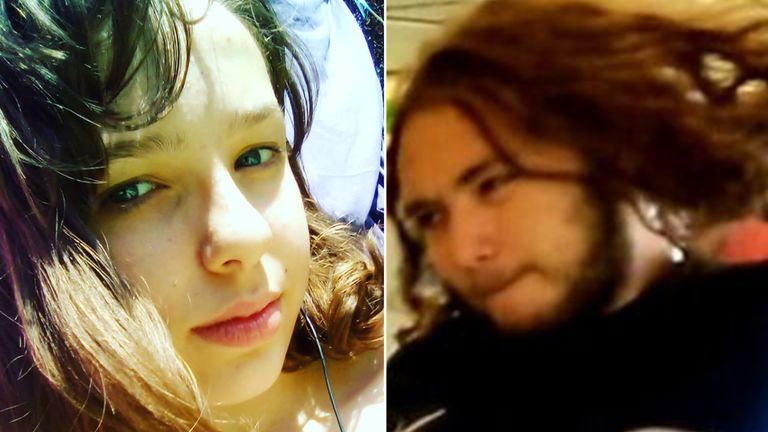When 19-year-old Shawn Seesahai was beaten and hacked to death in a savage machete attack in a Wolverhampton park, detectives were shocked to discover his killers were just 12 years old.
Days earlier, in another part of the country, Alfie Lewis, 15, was stabbed to death by a 14-year-old boy outside a primary school in Leeds.
Later the same month, a girl and boy went on trial in Manchester for what was described as the “sadistic” knife murder of 16-year-old Brianna Ghey when they were both aged 15.
Murders carried out by children have always horrified us as a society – but are they getting more common or are killers getting younger?
A Sky News analysis of the available Office for National Statistics data on the number of suspects aged under 16 who have been convicted of homicide – murder, manslaughter and infanticide – shows a relatively flat trendline from 2006/7 to 2022/3.
The percentage of homicide convictions going to under-16s compared with other ages doubled over 10 years, however, from about 1 in 50 in 2012/13 to 1 in 25 in 2022/23.
The 2022/23 figure is the highest since at least 2008/09, but as the percentage of under-16s is low overall the averages can be heavily skewed by relatively few convictions.
‘Much more serious and extreme’
Dr Simon Harding, a criminology expert, thinks there’s been “an increase in serious violence in young people” and that there is a greater “acceptance of extreme levels of violence between” children.
“Even something that might have been settled with fisticuffs or anti-social behaviour can suddenly dramatically turn into something much more serious and extreme,” he says.
“What 10 years ago might have been a punch in the face, five years ago might have been a stab to the arm or leg is now a stab to the neck or heart, which can lead to death.”
Bardia Shojaeifard was found guilty of murder after a jury heard how he attacked Alfie on his way home on 7 November last year “in revenge” for an altercation a week earlier.
He had posed for pictures with knives and took a 13cm-long kitchen knife he used to kill Alfie from his home with him to school in the Horsforth area of Leeds.
Sentencing him to life detention with a minimum term of 13 years in June, a judge described Shojaeifard as “outwardly normal” but with a “worrying interest in knives”.
Shawn, who had been walking through Stowlawn playing fields in Wolverhampton with a friend on 13 November last year, was struck on his back, legs and skull, while the fatal wound was more than 20cm deep and punctured his heart.
Read more:
Children and teenagers convicted of knife killings
Grieving sister shocked by age of killers
The boys responsible, the UK’s youngest knife murderers – who were detained for at least eight-and-a-half years – are believed to be the youngest children to be found guilty of murder since Robert Thompson and Jon Venables.
Thompson and Venables were aged just 10 when they abducted, tortured and murdered two-year-old James Bulger in 1993 and 11 when they were found guilty of murder.
A quarter of a century earlier, 11-year-old Mary Bell was sentenced to life detention in 1968 after being found guilty of manslaughter for fatally strangling two boys, aged four and three.
She was also aged just 10 at the time she killed her first victim.
But Sharon Carr is believed to be the youngest girl in the country to have committed murder.
Carr was 12 when she fatally stabbed and mutilated stranger Katie Rackliff, 18, after she left a nightclub in Camberley, Surrey, in 1992, but she wasn’t convicted for another five years.
In another crime that shocked the nation, Ricky Preddie was 13 and his brother Danny was 12 when they killed 10-year-old schoolboy Damilola Taylor in 2000, although they weren’t jailed for his manslaughter until 2006.
Is there now a greater ‘willingness to inflict pain’?
So there have always been cases of children who commit murder and other shocking crimes, but Dr Harding says: “We just tend to forget.”
However, from his experience preparing expert reports on court cases involving gang crime, exploitation and modern slavery, he says he has noticed a greater “willingness to inflict pain and suffering”.
Earlier this year, Scarlett Jenkinson and Eddie Ratcliffe were jailed for life with minimum terms of 22 years and 20 years respectively after they were found guilty of murdering Brianna when they were both aged just 15.
Jenkinson lured the vulnerable teenager, who was transgender, to Linear Park in the village of Culcheth, near Warrington, where she was stabbed 28 times in the head, neck, chest and back with a hunting knife on 11 February last year.
The pair had a fascination with violence and torture, prepared a “kill list” and meticulously planned Brianna’s “frenzied and ferocious” murder for weeks, their trial heard.
Jurors were told it was “difficult to fathom” how they could share such “dark thoughts” and carry out such a “disturbing” crime.
Beyond the high-profile cases that attract significant media attention, much of the country’s gang violence, including children killing other children, is largely hidden from the public, says Dr Harding.
He’s seeing “quite extreme things that wouldn’t happen a few years ago”, such as disabled people subjected to levels of cruelty bordering on torture, and young women raped and waterboarded by the people forcing them to sell drugs.
A different Dr Harding, forensic psychiatrist Dr Duncan Harding, works with adults and children who commit serious crimes. He says we really don’t know if killers are getting younger or youth violent crime is increasing because the evidence just isn’t there.
But the reporting of crime and the expansion of social media use means cases which may not have passed the threshold for widespread coverage in the past gain more traction, adding to a perception that it is.
‘Dehumanisation is spreading’
Even if youth violence isn’t on the rise, the “horrifying” crimes we see reported aren’t acceptable and we have to, as a society, try to understand what’s going on and try to improve things, Dr Duncan Harding adds.
The psychiatrist, who has provided expert evidence in court cases involving homicide, serious violence and terrorism, and has recently released his memoir The Criminal Mind, says the “dehumanisation” seen in gang violence seems to be spreading beyond gangs.
Our divided society is suffering an existential crisis since the COVID-19 pandemic, which is exacerbated by social media, he says, and he also highlights cuts to services for young people due to austerity as a potential factor.
But “stripping away youth clubs isn’t going to in itself lead to someone who’s going to stab or kill someone”, he says, and children don’t always commit violent crimes because of mental illness or difficulties in their lives.
“Obviously, they’re not normal, well-adjusted people, but in my experience, it’s not as straightforward as that either,” he says. “I don’t think that all offenders are victims.”
‘You have to have proper sentencing for knife crime’
The potential solutions are just as complicated – the psychiatrist suggests a public health approach that recognises the “epidemic” of knife crime among vulnerable young children, with schools, health workers and police working together to spot the early warning signs.
But he also supports the wider use of stop-and-search and the government ban on so-called zombie-style knives to try to keep weapons out of children’s hands, and says there need to be consequences at the point where youngsters are carrying knives.
Shawn’s parents urge children to “think about what they’re doing” and not to carry a weapon, but want to see tougher sentences for youngsters like the boys who killed their son.
“You have to have a proper sentencing for knife crime,” says his father Suresh Seesahai.
“Murder is murder. Murder is no coming back. If you murder someone they can’t come back… Life sentence is the best for you.”










